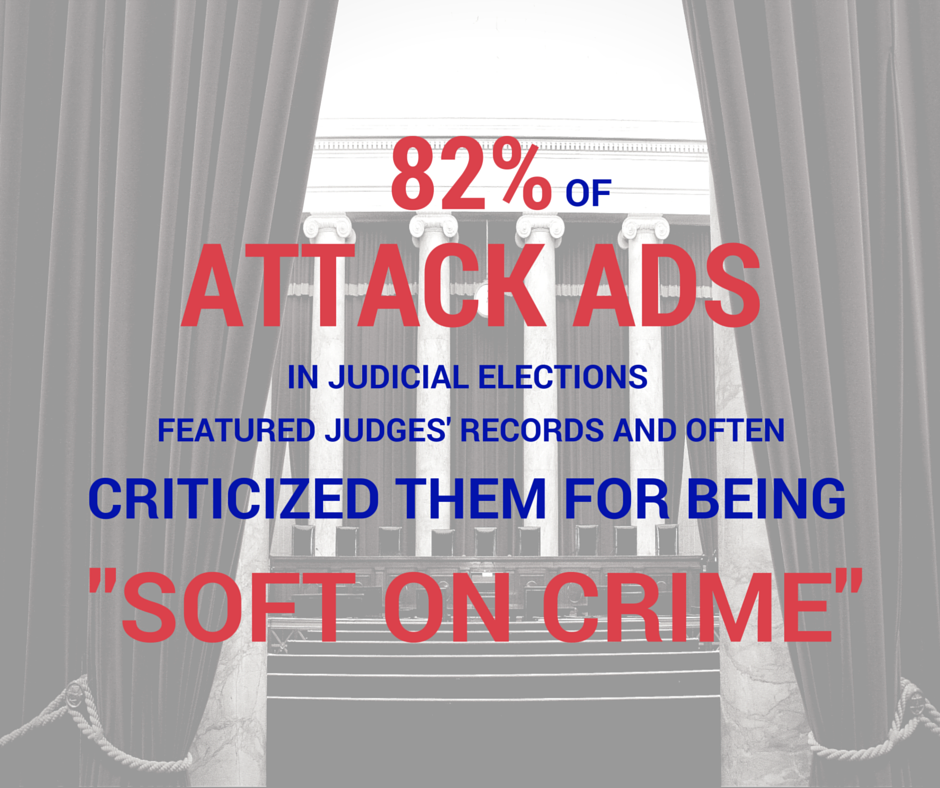If you went to court tomorrow, would you ultimately get a fair and impartial decision? Or are the scales of justice tilted by special interests spending big and playing dirty in efforts to shape elected courts to their liking?
A new national report underscores the troubling answer to these questions. Bankrolling the Bench: The New Politics of Judicial Elections 2013-14, by nonpartisan organizations Justice at Stake, the Brennan Center for Justice, and the National Institute on Money in State Politics examines such attempts to influence state Supreme Courts. It also asks whether we are ready to acknowledge the reality that state judicial elections have become overrun by money and politics and decide that the risk they pose to democracy is no longer acceptable.
During the most recent election cycle, more than $34.5 million was spent on state Supreme Court elections in 19 states, with a record 29 percent shelled out by special-interest groups in so-called “outside” spending, not coordinated with candidates or parties.
This means outside interests, pursuing their own agendas, are spending millions to support – or more often attack – judges for reasons that voters may never know. Much of this spending is by shadowy organizations that don’t disclose their donors. In several states, including West Virginia, it’s impossible to fully account for spending by these groups.
Where does the money go? Much of it bankrolls negative and misleading TV ads and billboards. Data shows that crime themes are most popular in judicial election advertising nationwide and that 82 percent of attack ads in judicial elections criticized incumbent judges for being “soft on crime.” At its worst, this translates to ads with grainy footage and somber music, lambasting a judge for letting some predator “go free.” Ads have accused Supreme Court justices in numerous states of coddling child predators and terrorists, of sympathy for rapists, of tolerating attacks on women and children, and more.
Sound familiar? Most of us remember the $3 million Don Blankenship spend to influence West Virginia’s Supreme Court under the guise of “And for the Sake of the Kids” as Massey Energy was preparing to appeal a $50 million jury verdict. Unfortunately, similar scenarios have played out over and over again in Supreme Court races across the county in recent years, especially since the Citizens United Supreme Court decision, which unleashed unlimited independent spending on elections.
But back to those crime-themed ads. Although they’re clearly intended to scare voters, they apparently scare judges just as much. Bankrolling the Bench notes mounting evidence that politicized judicial elections are undermining our justice system and the ability of criminal defendants to get a fair trial. Elected judges, possibly haunted by the pressure to be “tough on crime,” hand down tougher sentences in criminal cases, including more death sentences. That’s appalling, because it raises the very real possibility that life-and-death decisions are being made with an eye toward re-election.
The harm isn’t limited to criminal defendants, either, because state Supreme Courts actually have enormous influence over people’s everyday lives. They decide cases that affect education, labor, the environment, voting rights, real estate, corporate accountability, health care, and more. When partisan players put political and financial pressure on a court, these are the very issues that end up in the crosshairs. Issues invoked in 2013-14 state judicial campaigns ranged from environmental protection in Montana to fracking in Ohio to anti-tobacco litigation in Illinois.
Thankfully, in West Virginia our recent Supreme Court elections haven’t been contentious or the target of huge outside spending. However, the evidence is overwhelming: special interests and partisan politicians are exploiting judicial elections to stack our courts in their favor. The good news is that there is a range of solutions that can go a long way toward fixing this problem. They include public financing of judicial elections, which West Virginia adopted in 2010, along with strong disclosure of political spending so we know who’s trying to influence our elections, and tough recusal rules to make sure that special interests can’t buy justice.
Although our public financing program isn’t a perfect solution for all the problems created by our current method of judicial selection, it does play an important role in protecting the impartiality of the Court and the justices on it by shielding them from the biasing influence that can come with private contributions. Unfortunately, the current state of affairs in West Virginia allows anyone to hide their identity while influencing our elections. We deserve to know who is trying to influence our votes, not be kept in the dark.
The big spenders in our elections are banking on voters thinking there’s no solution to the growing politicization of judicial races and attacks on state courts. It’s time to show them they’re wrong and get behind serious reforms that will help keep money and politics out of the courtroom and restore public confidence that the scales of justice are in balance.
Julie Archer & Natalie Thompson
Co-Coordinators of WV Citizens for Clean Elections
This commentary also appeared in the Charleston Gazette-Mail on Nov. 3, 2015.

